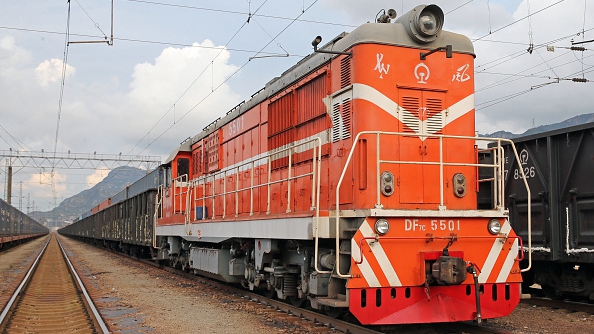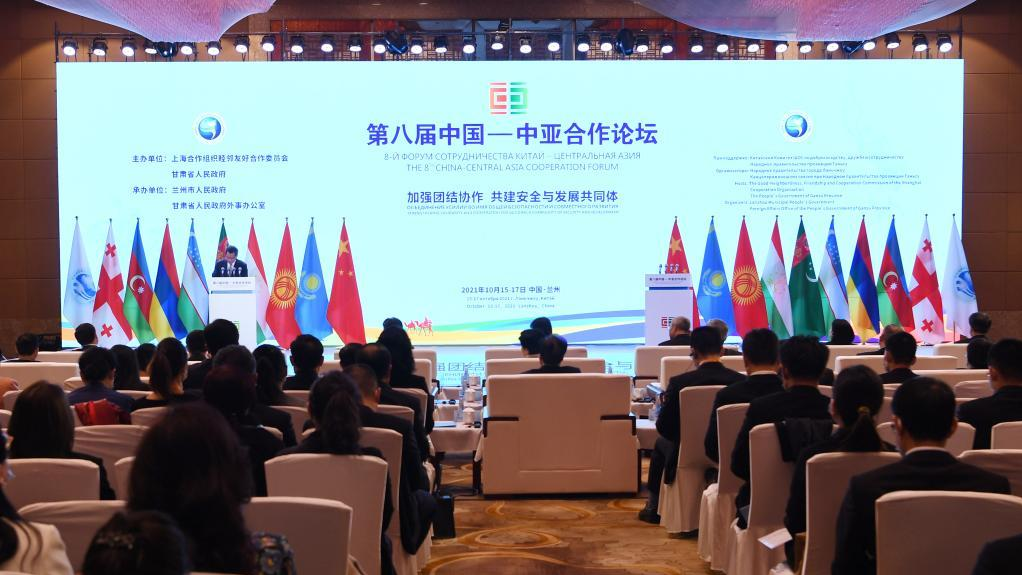
An international train carrying auto parts, plastic particles and daily necessities is on the railway line of Lianyungang Port, ready to leave for Central Asia. /Getty
An international train carrying auto parts, plastic particles and daily necessities is on the railway line of Lianyungang Port, ready to leave for Central Asia. /Getty
Editor's note: Hamzah Rifaat Hussain, a former visiting fellow at the Stimson Center in Washington and former assistant researcher at the Islamabad Policy Research Institute, is a TV anchor at Indus News in Pakistan. The article reflects the author's opinions and not necessarily those of CGTN.
The upward trend in the extensive and multifaceted cooperation between China and Central Asian states continues unabated with the year 2022 marking the 30th anniversary of China's relations with Kazakhstan, Kyrgyzstan, Turkmenistan, Tajikistan and Uzbekistan.
Each relationship is pivotal in ensuring that political, economic and regional security in the post U.S. withdrawal from Afghanistan era is secured. There is also plenty of promise as far as tapping into trade potential is concerned alongside promoting people-centric democracy and addressing regional security challenges.
With Afghanistan having witnessed the end of a debilitating 20-year war, Central Asian states and China are well poised to realize the tremendous investment potential in store which can usher in collective prosperity.
It was just two years before the U.S. withdrawal from Afghanistan that the fifth summit of the Conference on Interaction and Confidence-Building Measures in Asia (CICA) took place in Tajikistan where Chinese President Xi Jinping stressed on how building a prosperous Asia is a shared goal of all CICA member states with development being the key to addressing all socio-economic issues.
Note that this understanding resonates in each capital from Nur-Sultan to Bishkek where geopolitics and a prolonged American presence in Afghanistan has not affected the all-weather friendship that CICA states share with China which includes issuing joint calls for securing unfettered access to trade and synergizing efforts through investments.
The enormous natural gas reserves of member states and exports of raw materials provides an ideal foil for infrastructural projects within the Belt and Road Initiative (BRI) framework which President Xi had proposed to jointly build in 2013.

The opening ceremony of the 8th China-Central Asia Cooperation Forum in Lanzhou, capital of northwest China's Gansu Province, October 16, 2021. /Xinhua
The opening ceremony of the 8th China-Central Asia Cooperation Forum in Lanzhou, capital of northwest China's Gansu Province, October 16, 2021. /Xinhua
Central Asia will always be an integral component of the BRI where its strategic location alongside Russia and Eastern Europe provides tremendous prospects for East-West connectivity. It is therefore critical that all the CICA members implement the consensus reached at the second Belt and Road Forum for International Cooperation in Beijing as repacking or reaffirmations of the previous agreements reached between the countries.
Its implementation can allay concerns regarding the emergence of new potential security threats such as the East Turkestan Islamic Movement. Extremism can be defeated if economic prosperity through swift implementation of understandings reached takes place, which is precisely what Central Asia needs.
Taking the "Shanghai Spirit" forward also entails seeing eye to eye on issues such as curbing separatism, drug trafficking and transnational organized crime which have hampered development, compromised economic productivity and jeopardized the well-being of respective populations.
Both China and Central Asian states have denounced separatism and terrorism as global menaces with President Xi repeatedly stressing on combating the "three forces" of terrorism, separatism and extremism which was then echoed by dignitaries such as the outgoing Secretary General of the SCO, Vladimir Norov in December 2021. Note that there is great importance attached to collective arrangements to tackle prevalent security issues between the two sides which ensures that relationships are grounded in trust and goodwill with no room for hostilities or suspicions.
Central Asian history has several examples of terrorist groups such as the Islamic Movement of Uzbekistan being involved in the Batken Conflict against the armed forces of Kyrgyzstan with any separatist or terrorist activity in one country have a spiraling impact on other states, which both China and the respective governments of Central Asian states acknowledge and seek to eliminate.
The relationship between China and Central Asian states is a blueprint for actual democratization in the international order in the presence of great power designs particularly from the U.S. which seeks to implement unilateral decision without consent or consensus.
The absence of dictations and acceptance of diverse forms of governing systems has ensured that issues of actual importance such as poverty alleviation and technological development are prioritized. That is precisely what the "Shanghai Spirit" is all about and that is precisely what both sides strive to carry forward.
(If you want to contribute and have specific expertise, please contact us at opinions@cgtn.com.)

